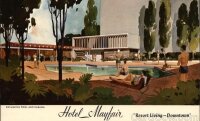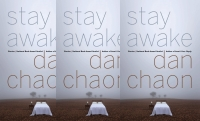By Jon Cone
Reviewed by Adam Tavel
Greying Ghost Press, 2010, 25 pages
The chapbook occupies a curious place in our literature. Skimming a respected poetry website reveals that over a hundred presses annually publish chapbooks, yet it is a format that suffers from several unforgiving stigmas, chief among these being that it is an abbreviated offering of verse (40 pages at most) that merely serves as a stepping stone to that literary holy grail, a ‘real’ first book. (Never mind the fact that chapbooks are now wildly popular with established poets, notes the reviewer who just received several desk copies via UPS.) The problem with such narrow logic, to tinker with an old cliché, is that it judges a book by the closeness of its covers rather than its contents. Such were the waves that swayed my mind’s dinghy as I read and re-read Jon Cone’s superb new chapbook The Plesyre Barge, a slender but absorbing collection that packs a remarkable degree of zaniness, range, and punch in 25 pages.
Of the eighteen poems in The Plesyre Barge, nearly half are surreal lyrics that display Cone’s adroitness with imagery and associative leapfrogging, and one can’t help but suspect that his most looming influences are far outside the American canon. True, there is something of James Wright in “Travel Crow Hill Road Twenty Miles North or So,” and a nod to Bukowski’s rugged but elliptical early work in “Bridge,” but the ethereal midnight howling that gives these poems their strangeness comes more from close studies of Lorca and Tomaz Salamun than it does, say, from Dickinson and Stevens. We see this in the exquisitely rendered violence of “The Worm Inside the Head,” a stark nightmare of a poem that details how “the sound a fist makes on meat is like no other” as men senselessly beat a horse to death in the street. (It also eerily conjures Robinson Jeffers’s “Apology for Bad Dreams,” one of this reviewer’s favorite poems despite its agnostic dread). Cone’s worldly reading is also apparent in “Political the Fence the Plate the Brush,” a taut Neruda-esque love poem that concludes The Plesyre Barge, whose speaker remarks to his beloved, “When I watch you braid your hair/I find new ways to be astonished by light.”
To continue framing The Plesyre Barge in terms of its guiding influences and aesthetics, however, would not only overshadow its originality, but would also shortchange its humor and variety. Though “A Poem for Hung-Over Buddhists and Fans of College Football Written on an Iowa 56 Ball State 0 Kind of Day” captures the stark ruggedness of the plains, it is impossible not to guffaw at its opening lines:
The unspecified ache in your balls didn’t remind you of the Northern Lights
With her ass capable of breaking your knees and your goofy prick lying spent
like a shell casing North-east of EdenSo that brushing her teeth with your hard-bristled toothbrush seemed nearly
an act
of animal husbandry.
This pyrotechnic wit is also at the core of the book’s title poem, a rollercoaster sestina with this grab-bag of line endings: “to,” “instruction,” “ready,” “bank,” “air,” and “flarge,” a nonsense coinage that belongs in the annals of Vonnegut, Swift, and Bierce. Like all sestinas, “The Plesyre Barge” feels a bit breathless by its final lines, as does “The Cullings,” a poem slogged with botanical jargon that gets lost in its own odd music, but two flat strings hardly ruin a symphony. Perhaps the most emotionally resonant poems in The Plesyre Barge are those which, through subtle shifts in rhythm, a keen sense of the line, and the raw force of understatement speak from the core of necessity: the bleak opener “The Favored,” the verse-poem “Golgotha,” the college-pal elegy “Inferno,” and the stoic “Jawbone Walking” that asks “if I could find a tongue/for us to share, would roses pull/comets through the sea/when death comes”?
In this digital century, American poets frequently lament the corporatization of our art and the numbing number of books published every year, but how often do we recognize our personal strand in the great virus, as we shake our heads in dismay, creasing the glossy cover on another title from the University of Flarge? The remarkable dedication of small presses like Greying Ghost might be the first timid steps toward an antidote, and at $6.50, Jon Cone’s The Plesyre Barge is a steal. Slap your puckered vein for its needle.








Pingback: Emprise Review // Review:: The Plesyre Barge: Jon Cone